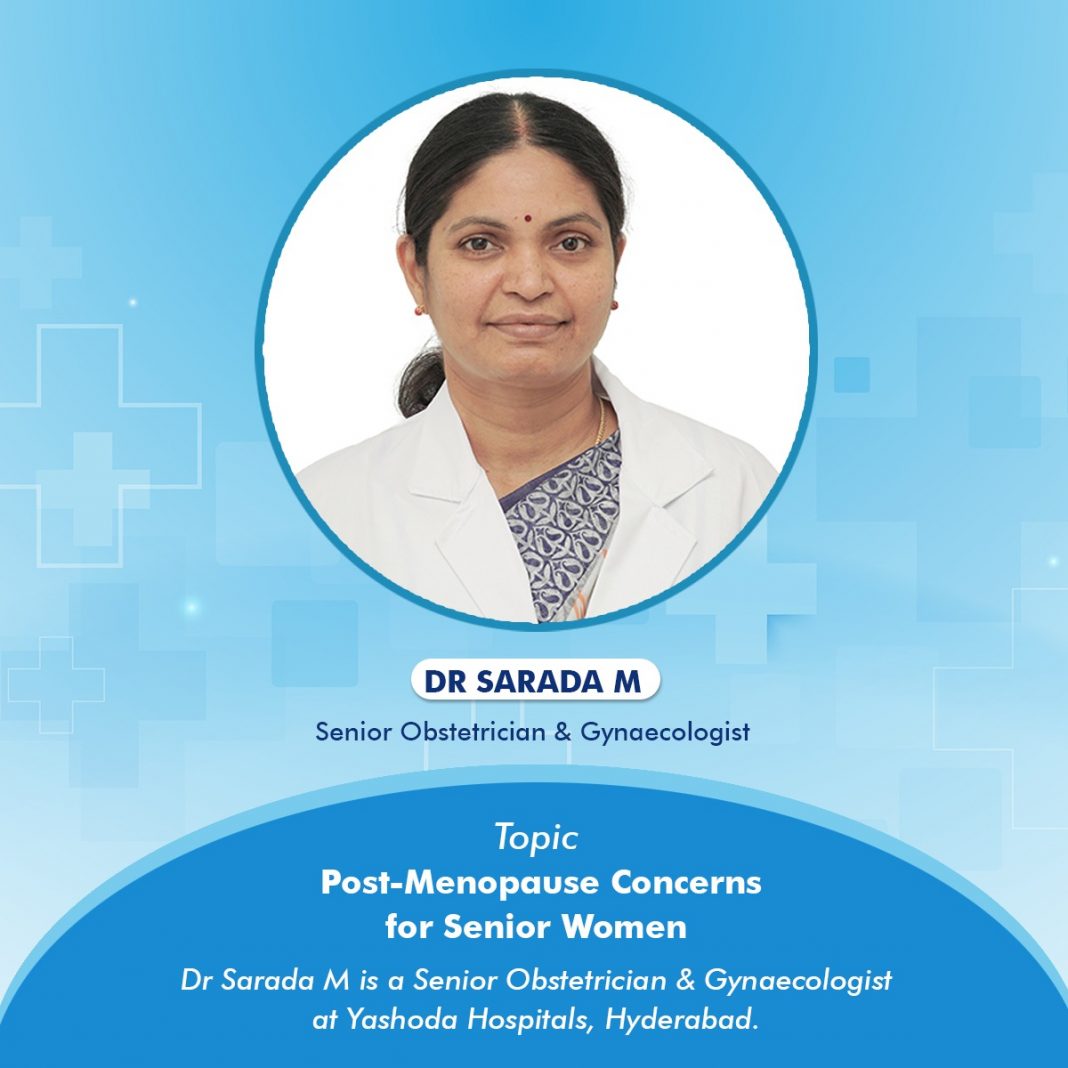On 01 Jul 2023, Seniors Today hosted their weekly Health Live webinar with Dr Sarada M, a Senior Obstetrician and Gynaecologist who spoke on and answered questions on Post Menopausal Concern for Senior Women.
About Dr Sarada M:
Dr Sarada M is a Senior Consultant Obstetrician and Gynaecologist at Yashoda Hospitals, Hyderabad, with over 21 years of experience. She received her medical degree from Kurnool Medical College, her postgraduate training from Osmania University’s Government Maternity Hospital, her DNB from St Theresa’s Hospital in Sanathnagar, Hyderabad, and a fellowship in laparoscopy at Keil University, Germany.
Dr Sarada M is also experienced in dealing with high-risk obstetric patients. She has performed numerous deliveries in women with complicated cases of SLE and other autoimmune disorders, as well as leukaemias, ITP, and other haematological conditions. Her ability to work as a team with respective specialities makes her a team leader to take care of the treatment of high-risk pregnancies.
Special Interest and Expertise:
- Non Descent Vaginal Hysterectomy or Scarless Hysterectomy
- Laparoscopic Surgeries
- Hysteroscopic Surgeries
- Hysteroscopy Procedures including Septal Resection and Myomectomy
- Laparoscopy Procedures including Complex Surgeries for Endometriosis, Fibroid Uterus and Malignancy
Awards and Achievements:
- Recognised as the Rising Star of the Year in Obstetrics & Gynaecology, Times Health Achievers Awards 2017
- First Prize for Paper Presentation, “Adolescent gynecological problems-An observational study” at FOGSI State Conference, Vizag State Conference, June 2011
Menarche is the commencement of the menstrual cycle.
Menopause is the permanent cessation of periods.
Women have menopause however men do not have an andropause or anything similar. This is because it is nature’s gift to women to help her from the morbidity and mortality associated with a pregnancy at an advanced age.
When a woman does not have periods for 12 consecutive months, retrospectively it is said that the woman has attained menopause.
There is no biological marker or test to confirm menopause. It is only a retrospective diagnosis.
Pre menopause is the reproductive age of the woman prior to menopause.
Perimenopause- 3-5 years before the cessation of the menstrual cycle and 1 year after the permanent cessation of periods. During this cycle, the ovaries gradually reduce the secretion of oestrogen and gradually stop their functioning.
Menopause transition is disturbed menstrual cycle experienced before menopause. The length of the cycle increases, occasionally it increases to once in 4-6 months.
Post menopause is the span of time taken from the final menstrual period and one year after that
Senescence is after the woman has attained the age of 60 years.
Different types of menopause are:
- Natural menopause: is what most women experience.
- Premature or early menopause: the natural age of menopause in the Indian woman population is 45-50 years. But if the woman hits menopause at an age before 35 years of age, it is called premature menopause. If she achieves menopause before the age of 40, it is called early menopause.
- Surgical menopause: women who get hysterectomy or bilateral oophorectomy- removal of the uterus and ovaries, will lead to surgical menopause.
Premature and early menopause needs to be evaluated. It can be because of the Genes/ genetic makeup of the individual.
The symptoms of menopause include:
- Vasomotor symptoms- hot flushes, night sweats
- Menstrual irregularities
- Dyspareunia i.e. painful sexual intercourse
- Mood changes- depression, insomnia
- Joint and muscle aches
- Loss of memory
- Weight gain, loss of muscles mass
- Urogenital issues
- Vaginal dryness
- Weak bones/ osteoporosis
Investigations to diagnose menopause:
Though menopause is a retrospective diagnosis, the following blood test can be done:
- FSH (Follicular Stimulating Hormone)- value more than 40ng/ dL
- Estradiol, a hormone secreted by the ovaries- value less than 20ng/dlL
- AMH (Anti Mullarian Hormone)
Oestrogen and progesterone are 2 important hormones secreted by the ovaries that keep the menstrual cycle continuous and also facilitate pregnancy. However, they have other functions as well, apart from periods and pregnancy.
Oestrogen is a hormone secreted by the ovaries and is also a protective hormone.
Oestrogen supports collagen production which gives us clear skin. It also keeps the bones strong.
It also increases the good cholesterol in our blood, protecting women against strikes and MIs.
It also protects the vagina against dryness.
Postmenopausal bleeding is bleeding per vaginum after one year of cessation of the menstrual cycle.
This is a cause for concern, because 1 in 10 women who have post menopausal bleeding might have cancer- of the ovary, uterus or cervix.
Cancer can mimic post menopausal bleeding, but that does not mean that every woman with post menopausal bleeding has cancer. Which is why it is important to evaluate and investigate as early as possible.
Pap smear is an investigation that should be done in all cases of post menopausal bleeding.
However, pap smear is a very important test to check for any malignancy in the cervix. This needs to be done every 3 years, till the age of 65 years of age. If all your pap smears have been normal up to the age of 65, you do not need to repeat the test unless advised.
Bone mineral density is also an investigation that should be done every 3 years after attaining menopause.
Mammography should be done every year after the age of 40.




